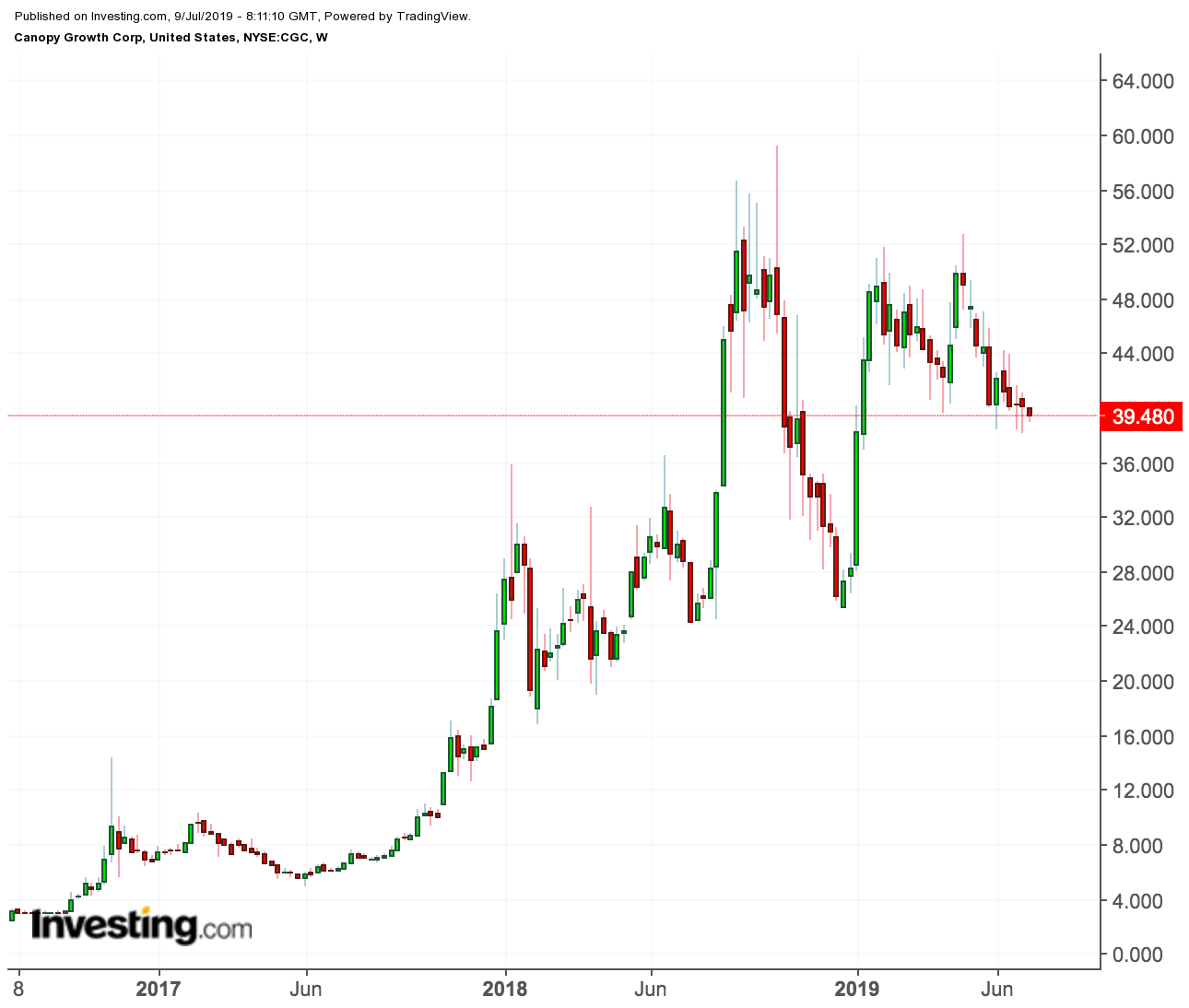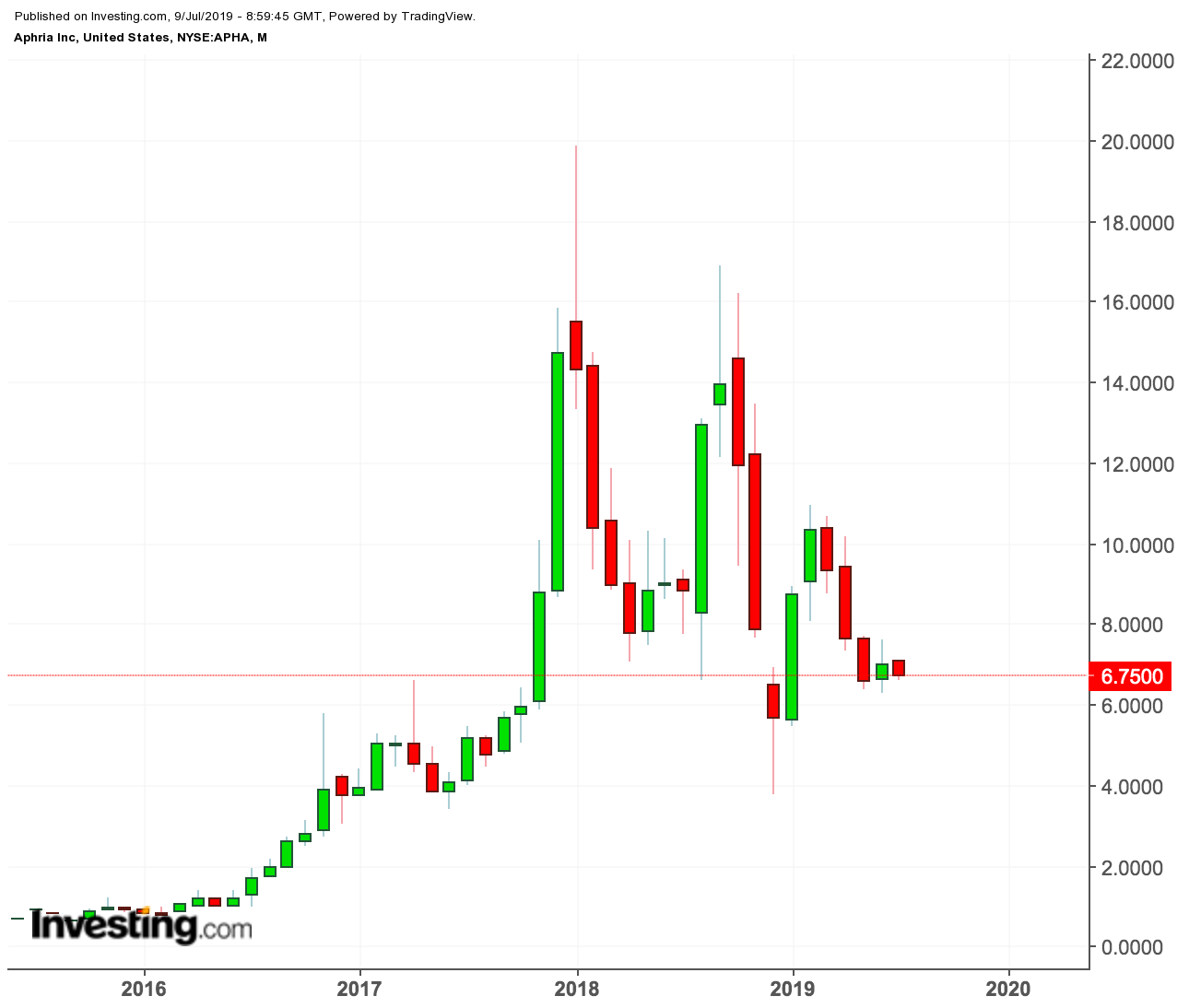By far, the biggest news in the cannabis sector last week was the ousting of Canopy Growth’s co-CEO Bruce Linton. The founder of the world’s largest marijuana company was removed last Wednesday by the firm’s board of directors, which is controlled by U.S.-based beverage giant Constellation Brands (NYSE:STZ).
Some observers have commented that Linton’s removal was a direct reaction to Canopy Growth's (NYSE:CGC), (TSX:WEED) latest earnings figures, unveiled last month, which showed a net loss of C$335.6 million (US$255.83 million), and tested Constellation’s patience.
The shake-up—which left Mark Zekulin, the former co-CEO, at the helm of Canopy—set the price of the company’s shares swinging wildly. Canopy shares took an immediate dive when the news of Linton’s dismissal was made public, dropping about 3.6%, or US$1.44 a share, to hit a low of US$39.095 (C$50.40). But by the end of last week, the stock price had made its way back up to US$40.16 (C$52.63).
Yesterday, it closed at US$39.47 and C$51.64.

Fuelling the theory that Constellation Brands was behind the move, the maker of Corona beer issued a statement saying it fully supports Canopy’s board of directors’ decision to appoint Zekulin as the sole CEO.
Top-Level Shakeups
Making front-page news in national newspapers in Canada, Linton’s departure has undoubtedly been the biggest corporate beheading in the cannabis sector, but it's only the latest in what is becoming a long string of top-level shake-ups in the marijuana industry.
These changing-of-the-guard moves, coming one after the other, make it difficult to simply view them as isolated events. They are arguably part of a trend.
Control of major cannabis companies is transitioning from the players who, in many instances, started the companies to a second generation of leadership. And this new wave of management marks a shift, putting a higher priority on profitability as operations continue to scale. It’s a sign of an industry that's maturing.
Several of the leading marijuana companies have gone through a similar process of dumping their top-ranking executives in recent months, and in many cases, these individuals were the original founders of the firms.
Aurora
For example, Aurora Cannabis (NYSE:ACB), (TSX:ACB) in February reorganized the occupants of the corner suite when it named Michael Singer as executive chairman above CEO and co-founder Terry Booth.
Booth had founded the Edmonton-based marijuana grower in 2013, when the Canadian government created the Marijuana for Medical Purposes Regulations. He built the company from the ground up.
Under his stewardship, Aurora went from owning a 100-acre plot of land to a world-leading medical marijuana producer with a US$7.52-billion (C$9.85-billion) market cap and operations in 24 countries across five continents.
Aphria
Over at Aphria (NYSE:APHA), (TSX:APHA) the Ontario-based medical cannabis grower announced the appointment of Irwin Simon as its new interim CEO at the end of December 2018. The former head of Hain Celestial (NASDAQ:HAIN), an organic natural foods producer, Simon replaced Vic Neufeld, who stepped down saying running the company for five years took a toll on his health and personal life.

From the beginning of 2013 to the end of 2018, Aphria shares went from about C$0.50 to C$7.85 (US$2.67 to US$5.69). Today, Aphria is a leading cannabis player operating in 10 countries on five continents with a market cap of US$1.69 billion (C$2.22 billion).
CannTrust
Similarly, CannTrust Holdings (NYSE:CTST), (TSX:TRST) last fall appointed banking executive Peter Aceto as its new CEO, replacing the company’s founder Eric Paul. Paul was moved to the position of board chairman and named a special adviser.
After Paul stepped down, two other top executives left the company – former president Brad Rogers and head of production Michael Revensdale.
CannTrust made headlines of its own yesterday, when a report issued by Health Canada, which regulates cannabis practices, outlined how the company failed to comply with regulations at its growing operation in Pelham, Ont. The company was found to be growing cannabis in five unlicensed rooms at a greenhouse facility between October 2018 and this March.
This timeframe covers the period when the company had pending applications with Health Canada to use the space for growing operations. Licenses for these rooms were eventually issued in April. But the news was enough to send the company stock plummeting more than 22%, to close at US$3.83 (C$5.00).
